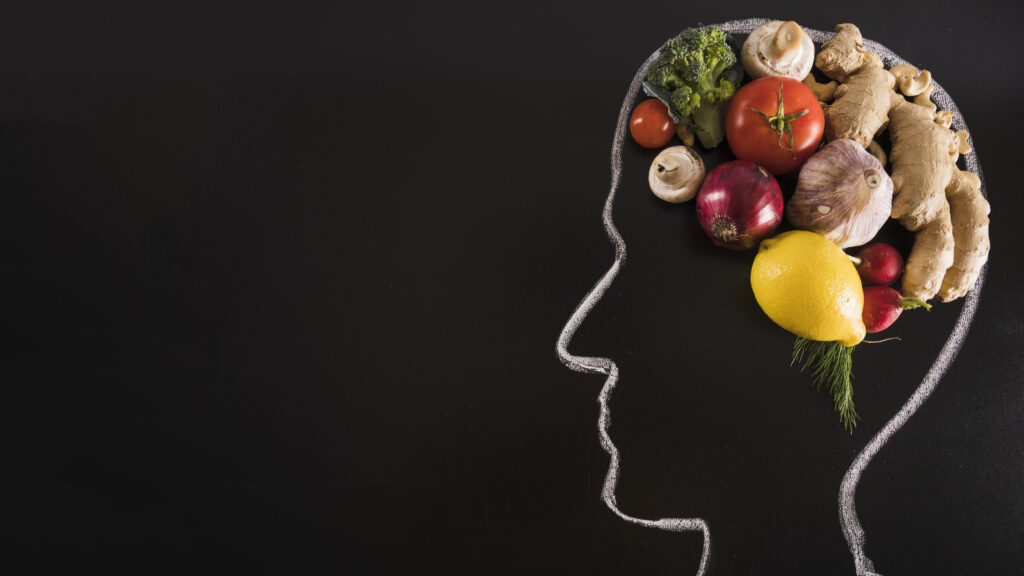
The link between diet and mental health is profound, with increasing research proving that what we eat has a direct impact on our emotional well-being and cognitive function. Certain nutrients are important in maintaining brain health, regulating mood, and reducing stress and anxiety. Our diet, from Omega-3 fatty acids that improve mood to antioxidants that protect brain cells from damage, has a significant impact on how we feel and think. By focusing on nutrient-rich foods, we can nourish both our minds and our bodies, paving the way for a happier, healthier life — in other words, “eating our way to happiness.”
Table of Contents
ToggleTop 10 Nutrients to Boost Your Mental Health
1. Omega-3 Fatty Acids: The Brain’s Building Blocks
Omega-3 fatty acids are important for brain health, helping to improve mood, reduce anxiety, and improve cognitive function. These good fats help control neurotransmitters such as serotonin, which are linked to happiness and emotional well-being. Omega-3 fatty acids have been shown to reduce sadness and anxiety symptoms while improving overall brain function. Fatty fish such as salmon and mackerel, as well as plant-based options like walnuts and flaxseeds, are good providers of omega-3 fatty acids Including Omega-3 fatty acids in your diet can be as simple as adding a handful of walnuts to your daily oatmeal or eating grilled salmon.
2. Magnesium: The Calming Mineral
Magnesium, sometimes known as the calming mineral, helps to reduce stress, improve sleep quality, and regulate mood. It helps activate neurotransmitters that calm the mind, making it a crucial nutrient for mental health. Foods high in magnesium include dark leafy greens, nuts, seeds, and avocados. To increase your magnesium intake, try adding spinach or kale to your salads, munching on almonds or pumpkin seeds, or incorporating avocado into smoothies. Including these easy modifications will greatly improve your body’s stress management and sleep quality.
3. Vitamin D: The Sunshine Vitamin
Vitamin D, also known as the “sunshine vitamin,” is essential for mental health because it helps to relieve symptoms of depression and anxiety while also improving overall mood. It is naturally produced by the body when exposed to sunlight and can be found in foods such as fortified dairy and mushrooms. However, in areas with little sunlight, particularly during the winter months, many people struggle to get enough Vitamin D. In such cases, supplements can be a critical solution for maintaining adequate levels, which can have a significant impact on mood regulation and emotional well-being.
4. B Vitamins: The Energy Boosters
B vitamins are essential for maintaining mental health because they support neurotransmitter function, reduce fatigue, and improve concentration. These vitamins, which include B6, B9 (folate), and B12, help to regulate mood and cognitive function by promoting the production of serotonin, dopamine, and other important brain chemicals. A B vitamin deficiency can cause symptoms such as brain fog, irritability, and even depression. To maintain balanced mental health, consume foods high in B vitamins, such as whole grains, eggs, legumes, and leafy vegetables, and eat a well-balanced diet.

5. Zinc: The Mood Stabilizer
Zinc is essential for maintaining brain function and emotional stability, and studies have shown that it can reduce symptoms of depression and anxiety. This essential mineral regulates neurotransmitters, which helps to balance mood. Zinc-rich foods include meat, shellfish, legumes, and seeds. To easily increase your intake, try a snack of roasted pumpkin seeds or a simple chickpea salad with lemon and olive oil. Both are delicious, nutrient-dense options that promote mental health while also providing a healthy dose of zinc.
6. Iron: The Oxygen Carrier
Iron helps transport oxygen throughout the body, which supports cognitive function, reduces brain fog, and prevents fatigue. When the brain gets enough oxygen, mental clarity and focus improve. Red meat, lentils, spinach, and tofu are all excellent sources of iron in your diet. To improve iron absorption, combine these foods with vitamin C-rich foods like citrus fruits, bell peppers, or tomatoes. This combination increases iron uptake, ensuring that you get the full cognitive and energy-boosting benefits.
7. Antioxidants: Brain Protectors
Antioxidants protect the brain by reducing oxidative stress, which causes cell damage and contributes to aging and cognitive decline. These potent compounds help to neutralize harmful free radicals, promoting brain cell health and mental clarity. It is simple to incorporate antioxidant-rich foods into your diet, such as berries, dark chocolate, nuts, and green tea. To naturally boost your brain health, eat a handful of berries for breakfast, snack on a square of dark chocolate, sprinkle nuts on salads, or drink green tea throughout the day.

8. Amino Acids: The Building Blocks of Neurotransmitters
Amino acids are necessary for mental health because they are the building blocks of neurotransmitters, chemical messengers that control mood, anxiety, and relaxation. Tryptophan, for example, is a precursor to serotonin, also known as the “feel-good” neurotransmitter, which regulates mood and promotes relaxation. Tyrosine is involved in the production of dopamine, a neurotransmitter associated with motivation and pleasure. Including amino-acid-rich foods in your diet, such as lean meats, eggs, beans, and legumes, can help to balance neurotransmitter levels, thereby naturally improving mood and reducing anxiety.
9. Probiotics: Gut-Brain Connection
Probiotics play an important role in the gut-brain connection, which is a relationship in which your gut health directly influences your mental health. The gut is commonly referred to as the “second brain” because it produces many of the same neurotransmitters, such as serotonin, that regulate mood and emotions. Fermented foods such as yogurt, kefir, sauerkraut, and kimchi contain probiotics, which help maintain a healthy balance of gut bacteria. This balance not only improves digestion, but it also benefits mental health by lowering anxiety symptoms and increasing mood. Supporting your gut health can lead to increased emotional well-being.
10. Folate: The Brain Energizer
Folate, also known as vitamin B9, is important for reducing depression symptoms and improving cognitive function. It promotes the production of neurotransmitters such as serotonin, which are necessary for mood regulation. Low folate levels have been linked to an increased risk of depression. To ensure adequate folate intake, eat leafy greens (spinach, kale), oranges, beans, and fortified cereals. For a simple folate-rich recipe, try a refreshing salad with spinach, avocado, chickpeas, and a citrus dressing, or make a nutrient-dense smoothie with kale, oranges, and chia seeds.

How to Create a Nutrient-Rich Meal Plan for Mental Health
To incorporate key nutrients that promote mental health, eat whole foods high in Omega-3s, B vitamins, magnesium, and other essential vitamins and minerals. Begin by including a variety of fresh fruits, vegetables, whole grains, lean proteins, and healthy fats in your daily diet. Achieve balance by consuming a variety of nutrient-dense foods such as fatty fish, leafy greens, nuts, seeds, and fermented foods. Avoid processed foods and excess sugar, as they can have a negative impact on mood and mental clarity.
Here’s a sample weekly meal plan that includes all ten mental health-boosting nutrients:
Breakfast: Oatmeal with walnuts, flaxseeds, and berries (rich in B vitamins, Omega-3s, and antioxidants).
Lunch: Quinoa salad with spinach, avocado, pumpkin seeds, and grilled chicken (rich in magnesium, zinc, and folate).
Snack: Greek yogurt with honey and dark chocolate (rich in probiotics and antioxidants).
Dinner: Grilled salmon with roasted vegetables and lentils (rich in omega-3s, iron, and B vitamins).
Conclusion
A nutrient-dense diet promotes mental health by providing the brain with essential vitamins, minerals, and antioxidants that regulate mood, reduce stress, and improve cognitive function. You can naturally improve your emotional well-being by eating leafy greens, fatty fish, nuts, and probiotics on a daily basis. Small changes, such as increasing your Omega-3 intake or incorporating probiotic-rich snacks, can have a significant impact over time. Begin today by nourishing your mind and body—share this post, leave a comment about your favorite nutrient, or try the sample meal plan for a happier, healthier you!
FAQS
Nutrition has a significant impact on mental health because it influences brain function, neurotransmitter production, and stress responses. Certain nutrients, such as Omega-3s, B vitamins, and magnesium, have been shown to improve mood regulation and alleviate symptoms of anxiety and depression.
Omega-3-rich foods (such as salmon), antioxidants (such as berries), magnesium (such as leafy greens), and probiotics (such as yogurt) are all excellent for promoting mental health and lowering stress.
Yes, a well-balanced diet rich in essential nutrients can help with anxiety and depression symptoms by promoting brain chemistry and improving overall mental health. For example, omega-3 fatty acids and magnesium have been linked to mood regulation.
While individual results may vary, some people notice an improvement in mood and energy levels within a few weeks of eating more nutrient-dense foods. Long-term dietary changes have a positive impact on mental health.
A well-balanced diet can provide most nutrients, but some people may benefit from supplements, particularly Vitamin D, Omega-3s, or other nutrients in which they are deficient. Before beginning any supplementation regimen, consult with a healthcare professional.